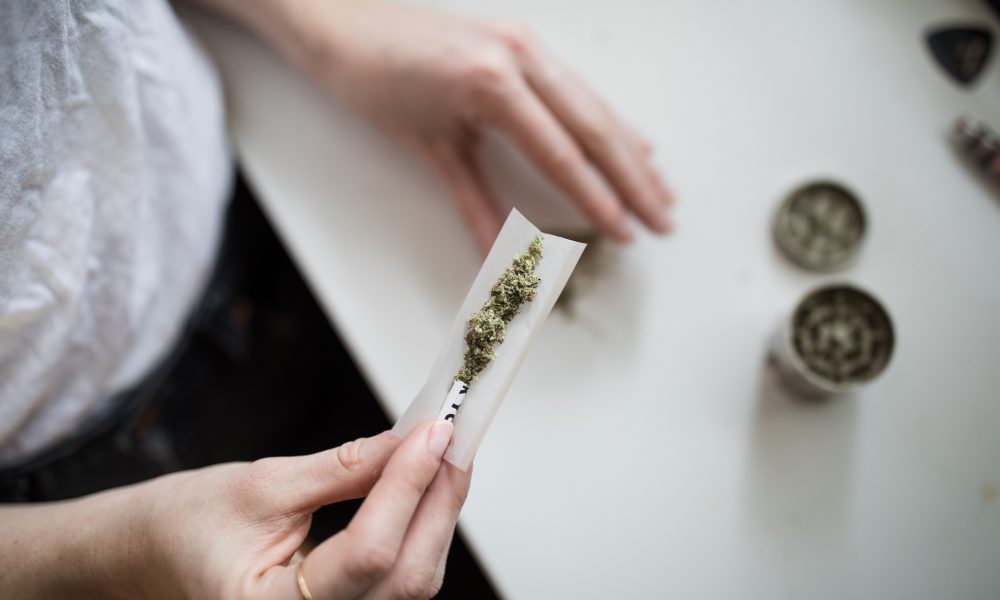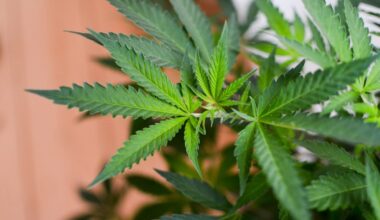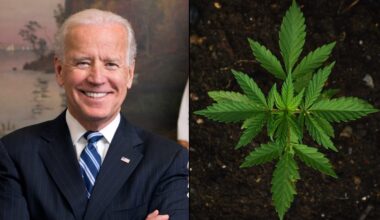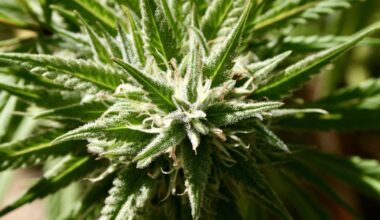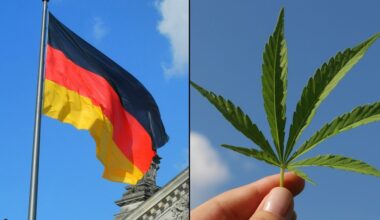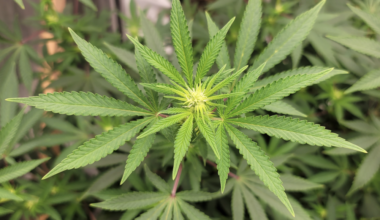Washington, D.C. lawmakers on Tuesday rejected a measure to effectively circumvent a congressional ban on locally legalizing adult-use marijuana sales by allowing adults 21 and older to “self-certify” themselves as medical cannabis patients without needing a doctor’s recommendation.
The emergency resolution faced criticism from some advocates over separate provisions that would have cracked down on unlicensed businesses that are using existing policy to “gift” cannabis to people who purchase unrelated products and services.
District Council Chairman Phil Mendelson (D) sponsored the legislation, which is the product of a unique legal and regulatory quandary that the District has found itself in since voters approved the legalization of personal cannabis possession, cultivation and gifting at the ballot in 2014.
Despite strong interest in creating a regulated sales model for cannabis, congressional appropriations legislation has blocked local lawmakers from implementing a system of marijuana commerce.
The Council defeated a resolution to declare emergency status and allow expedited action on the bill even after an amendment to the underlying legislation was floated to significantly increase the cap on medical cannabis business licenses.
The emergency declaration resolution received majority support, with an 8-5 vote, but it needed a supermajority of nine members to clear the way for the bill to be considered without moving through the traditional committee process. It is likely that lawmakers will bring up the proposed reforms as non-emergency legislation at a later time.
Don’t be confused by misinformation. This legislation makes it easier to get cannabis legally. And there is nothing in the bill about criminal penalties.
You can read the bill (and a summary memo) here:https://t.co/nKx53gTqhx pic.twitter.com/H4IpR32vyG
— Phil Mendelson (@ChmnMendelson) April 1, 2022
“There’s nothing in the bill about criminal penalties—nothing. It’s entirely in terms of [civil enforcement],” Mendelson said at a press briefing on Monday, reacting to concerns from advocates who say the enforcement component could further the disproportionate harms of the war on drugs while benefiting existing medical cannabis companies by increasing their customer base. “The important part of the legislation is that it’s making it easier for the legal medical marijuana businesses, which we are licensing, to be able to maintain their customer base.”
“The legal shops have seen a substantial erosion of their business to the legal market and I want to be clear, this is not a gray market, it’s an illegal market,” he said.
While local legislators, as well as the mayor, are eager to formally create a regulated market for adult-use marijuana, they’ve been blocked from doing so because of a GOP-sponsored congressional spending bill rider that’s been annually renewed, specifically prohibiting D.C. from using its local tax dollars to implement a system of recreational cannabis commerce.
—
Marijuana Moment is already tracking more than 1,000 cannabis, psychedelics and drug policy bills in state legislatures and Congress this year. Patreon supporters pledging at least $25/month get access to our interactive maps, charts and hearing calendar so they don’t miss any developments.![]()
Learn more about our marijuana bill tracker and become a supporter on Patreon to get access.
—
But it remains to be seen when that rider might be lifted. Under Democratic control, both chambers of Congress have proposed lifting the rider from Rep. Andy Harris (R-MD) in recent years, but last year’s appropriations bill maintained the ban, and President Joe Biden last month proposed for the second time a budget that would continue the cannabis restriction.
Mendelson said on Tuesday that Congress “left us in a purgatory” with the rider.
“The solution is to remove the rider,” he added, noting that D.C. Mayor Muriel Bowser (D) also called for a federal fix to this unique problem in a letter she released ahead of the Council’s consideration of the resolution on Tuesday.
The mayor said that the “Council should continue to level the playing field for licensed providers, keep pushing for an adult-use and tax and regulate system, but be careful to advance unfunded mandates for our enforcement agencies during times of great change.”
“This could result in creating expectations in the community that we have no ability to fully achieve,” she said. “We continue to call on the president and Congress to remove these anti-home rule riders. These policy changes are best left to our elected legislature.”
As an interim solution to the congressional blockade—as well as the grey market of businesses that are “gifting” cannabis in exchange for non-marijuana items and services—Mendelson’s legislation proposed to reform the District’s medical marijuana laws, primarily by creating a quasi-recreational market by allowing those 21 and older to self-certify themselves as patients eligible for cannabis sold at licensed dispensaries. The self-certification policy would have sunsetted on September 30.
But while a main part of the intent behind the emergency legislation was to “reduce administrative barriers as much as possible for patients”—including by raising the possession limit from two to eight ounces—not all advocates were supportive of the measure as drafted.
Some wondered why the chairman didn’t take further steps to approve far more medical cannabis providers, including by extending licensing opportunities to those operating in the grey “gifting” market. The new amendment was circulated in an attempt to address those concerns, though it never got a vote after the emergency declaration resolution failed.
For current grey market operators, the resolution proposed civil enforcement action that would have resulted in a maximum $30,000 fine for unregistered businesses that “gift” marijuana in exchange for other products.
The fine could have also been imposed on landlords that permit such business activity on their property. And landlords could have faced an additional $60,000 fine for subsequent violations.
As introduced, those penalties wouldn’t have started to be enforced until May 16. The amendment as floated would have pushed back that enforcement date to August 2, however.
Ahead of the vote, several councilmembers raised concerns about the chairman’s proposal at a District Council breakfast meeting, and it became increasingly clear that the resolution would not receive the nine votes required.
“I think it is incumbent on us to make sure that those businesses that want to get licenses can do so,” says McDuffie of the gifters.
— Martin Austermuhle (@maustermuhle) April 5, 2022
Councilman Kenyan McDuffie (D), who is running to become the District’s attorney general, circulated the amendment to significantly increased the number of dispensaries that could be licensed, increasing the cap from eight to 32.
Councilman Charles Allen (D) spoke in favor of the chairman’s bill and the amendment, and he echoed frustration over the ongoing congressional blockade.
“We thought that with a Democratic majority, we no longer be subject to the whims of one member of Congress from the eastern shore of Maryland. But we’re still in the same place and angry [at the] national leadership for letting us down yet again.”
“They used us as a bargaining chip before. They will do so again until we have no budget riders and we get the statehood that we deserve,” Allen said. “But that aspiration is not where we find ourselves today. If we could have regulated non-medical marijuana, we would have and we’d be collecting taxes with the ensuring safety of all the businesses that call themselves I-71 compliant, but there’s no such thing as a commercial transaction that is I-71 compliant.”
The emergency declaration resolution accompanying the legislation said that it is “estimated that the illicit cannabis market in the District logs $600 million in sales annually, including those by illicit cannabis storefronts and delivery services, and this, in turn, is economically harming the medical cannabis program where the majority of registered dispensaries are owned by minorities.”
“These businesses sell untraced, untested cannabis that is mostly cultivated outside of the District, are often located in areas where legal facilities are not allowed, such as being within 300 feet of schools and recreation facilities, due to concerns of youth exposure to cannabis and cannabis products, and do not pay the fees and taxes licensed facilities must pay, putting licensed cannabis businesses at a competitive disadvantage.”
Mendelson has faced pushback over the specifics of the proposal from advocates who viewed the civil penalty as unnecessary. The advocacy group D.C. Marijuana Justice (DCMJ) has been especially vocal about their criticism of the resolution.
Numerous DC-based entrepreneurs have put their life savings into opening gift shops and they should not be bankrupted by this law. These businesses need a path to licenses. The path starts and ends with @DCGov_ABRA
Click “Letter of Intent”https://t.co/vNiI5TRLjk
…..WOOPS!— DC Marijuana Justice💨🏛💨🏛 (@DCMJ2014) April 1, 2022
The D.C. chapter of the NAACP also said in a letter to Mendelson that the resolution as drafted would “make it harder for many Black-business owners to enter and operate within this licensed system and will adversely affect those who are currently operating under Initiative 71.”
NAACP opposes @Chmnmendelson Medical Marijuana emergency legislation, which will impose civil penalties on Initiative 71 businesses. #STAND4BLACKBUSINESSES pic.twitter.com/fkOGg4y2q2
— NAACP DC BRANCH (@dcnaacp) April 5, 2022
The patient self-certification provision of the measure would have represented a significant expansion of another piece of legislation enacted into law this year that allows people 65 and older to self-certify for medical cannabis without a doctor’s recommendation.
The bill also further extended the registration renewal deadline for patients and created a week-long medical marijuana tax relief “holiday” that coincides with the unofficial cannabis event known as 4/20.
In 2019, another D.C. lawmaker proposed a separate medical cannabis reform bill meant to ease the registration process for patients. Instead of having to wait several weeks for regulators to process their medical cannabis approvals, patients would simply fill out an application with the city health department and would then automatically qualify to legally purchase marijuana on a provisional basis.
D.C. lawmakers have been preparing to implement a more traditional, regulatory model for adult-use marijuana for years.
Lawmakers held a joint hearing in November on a pair of bills to authorize the legal sale of recreational marijuana and significantly expand the existing medical cannabis program in the nation’s capital.
At the time, a provision of the bill that could have led to a broad crackdown on the city’s unregulated market for recreational cannabis was removed, much to the relief of advocates who criticized the proposed measure over a component that would have punished businesses that “gift” marijuana in a manner that circumvents the local prohibition on retail cannabis sales.
The mayor said last April that local officials are prepared to move forward with implementing a legal system of recreational marijuana sales in the nation’s capital just as soon as they can get over the final “hurdle” of congressional interference.
Bowser introduced a cannabis commerce bill last February, though her measure was not on the agenda for November’s hearing alongside the cannabis legalization proposal put forward by Mendelson.
The chairman said on Tuesday that, as soon as Congress removes the D.C.-specific cannabis rider, “we will move forward with that legislation” to formally enact adult-use legalization.
Local marijuana activists also proposed an amendment to Mendelson’s legalization bill that would allow small entrepreneurs to sell cannabis at farmers markets.
Last March, a federal oversight agency determined that the congressional rider blocking marijuana sales in D.C. does not preclude local officials from taking procedural steps to prepare for the eventual reform, such as holding hearings, even if they cannot yet enact it with the blockade pending.
This year, a D.C. Council committee unanimously approved a bill to ban most workplaces from subjecting job applicants to pre-employment marijuana testing. It would expand on previous legislation the D.C. Council approved to protect local government employees against workplace discrimination due to their use of medical cannabis.
Separately, a group of activists last year announced an effort to pressure local lawmakers enact broad drug decriminalization, with a focus on promoting harm reduction programs, in the nation’s capital. A poll released last year found that voters are strongly in favor of proposals.
At the congressional level, Rep. Eleanor Holmes Norton (D-DC) said in November that she is “closer than ever” to removing the federal blockade on cannabis commerce in her district.
Schumer Talking To GOP To ‘See What They Want’ In Marijuana Legalization Bill Coming This Month
Medical Disclaimer:
The information provided in these blog posts is intended for general informational and educational purposes only. It is not a substitute for professional medical advice, diagnosis, or treatment. Always seek the advice of your physician or other qualified healthcare provider with any questions you may have regarding a medical condition. The use of any information provided in these blog posts is solely at your own risk. The authors and the website do not recommend or endorse any specific products, treatments, or procedures mentioned. Reliance on any information in these blog posts is solely at your own discretion.
